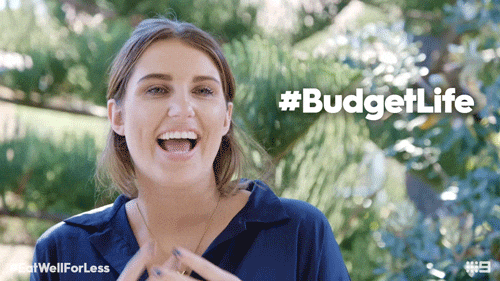A wise person once said that a wallet is like an onion: opening it makes you cry. It’s funny, relatable, and a tongue-in-cheek insight into the importance of budgeting. If you know how to organize your finances, your wallet won’t have anything in common with an onion.
For many, budgeting is an intimidating word. It sounds like it’s reserved for people who have lots of money at their disposal. However, budgeting applies to any income. It helps you see where your money goes and tweak your spending accordingly, especially if there’s an emergency or a goal you want to achieve.
Whether it’s your first time learning how to budget money or you’re just looking to improve your current strategy, you’ve come to the right place. Let’s roll!
Why is Learning How to Budget Money Important?
Before you learn how to budget money, take the time to appreciate its benefits. Here are some reasons that’ll inspire you to start budgeting:
It Gives You Control Over Your Money
Think of a budget as a limiter for your money. Without it, your money will behave like sand; it won’t last long in your hand. Before your money runs out, use it for the things that matter. You’ll develop a habit of saving if you practice mindful spending.
It Helps You Identify Bad Spending Habits
If you’re wondering why you always run out of money every month, a budget will help you keep tabs on your spending activities. That way, you can pinpoint habits you need to eliminate and expenses you can live without.
It Aids in Planning for Your Future
You’ve been dreaming of flying to Japan for a vacation. And while your income says that it’s possible, your monthly expenses say otherwise. If you learn how to budget money, you can get rid of unnecessary overheads and make room for your dream vacation. This also applies to your other goals in life.
How to Budget Money: Important Things to Take Note Of
-2.png?width=677&name=Pics%20for%20blog%20(3)-2.png)
You can learn how to budget your money by building good financial habits. Here’s how to create a budget plan:
Check Your Net Income
Your budget chiefly depends on your net income, which is your take-home pay minus taxes[1] and deductions such as your health card, Pag-IBIG, and SSS. If you have side gigs that bring in regular income, it would be wise to include them. Just don’t forget to subtract the outlays, such as taxes and operational expenses. On the other hand, if you’re a freelancer without a regular income, an average net amount will do.
So why should you get a picture of your net income? It gives you an idea of how much you actually have at your disposal, which in turn encourages mindful spending.
Look at Your Spending
Once you know how much money you have, you need to track where it’s going. As mentioned, monitoring your spending can help you identify bad habits and unnecessary expenses.
For a more organized approach, categorize your expenses:
- Fixed expenses – These are the overheads that come every month without fail. These include your rent or mortgage, electricity bill, water bill, internet bill, subscription to online streaming services, and other utilities.
- Variable expenses – These are the expenses that vary monthly, such as clothing, gas, groceries, and entertainment. Since these expenses change from time to time, you can find ways to cut back here.
There are two ways to track your expenses: either use a pen and paper or go digital with an app or a spreadsheet.
List Down Your Goals
Next, identify all your short-term and long-term goals. This is an important step, as it helps you make a personal budget plan that’s grounded and realistic. You’ll gain perspective on what to prioritize. Moreover, a goal, whether it’s getting out of debt or taking your family on a trip abroad, gives you purpose or direction.
To budget money wisely, make sure you prioritize the following:
- Emergency fund
- Debt repayment
- Mortgage completion
- Child’s education
- Retirement fund
Draft Your Budget
After tracking your spending and listing all your goals, the next step is to draft your budget. The 50-30-20 rule is a popular method among experienced personal finance experts and beginners just learning how to budget money.
This is how it works:
- 50% of your income goes to needs – These include rent, mortgage, transportation, electricity, water, internet, and insurance.
- 30% of your income goes to wants – These include shopping, vacations, hobbies, coffee with friends, and entertainment (movies, Netflix, Spotify, etc.)
- 20% of your income goes to savings and debt repayments – These include regular savings, emergency fund, retirement fund, loans, and investments.
After creating a budget draft, get the sum of all your expected expenses and subtract it from your net income. If your number is close to zero, it means you have just enough money but no surplus for unforeseen expenses. Go over your budget again and make adjustments until you get comfortable wiggle room.
Automate Your Budget
The goal is to make budgeting second nature. You can do so by automating the whole endeavor. For instance, you can set up your bank account to automatically pay your credit card debts or utility bills. The same applies to your savings.
Putting your money on autopilot comes with some benefits. First, you don’t miss your bills payment. Second, you get to avoid expensive late fees, which can take a portion of your budget. Ultimately, you’re not stressed out.
Make Some Adjustments
It’s common for those just learning how to budget money to think that a budget should be set in stone. That shouldn’t be the case. Life is full of changes. When they happen, you need to adjust your personal budget plan accordingly.
Here are some events that usually call for a budget adjustment:
- Windfalls – These include unexpected incomes, such as bonuses, cash gifts, inheritances, and lottery winnings. Adjust your budget by increasing the allocation for debt payments.
- Salary increase – Keep living within your means to budget money prudently. Use the increase to pay debts or save for a specific goal.
- Inflation – Adjust your budget due to soaring prices of commodities, especially if your income remains the same.
- Debts – These should push you to review your budget, let go of unnecessary impulse purchases, and avoid accumulating new debts.
Read more: Beat Inflation: Tips to Maintain Your Household Budget Amid Price Hikes
A Sample Budget Template
Now that you know how to budget money, it’s time to put your new knowledge into practice. Here’s a sample template to show you how money should be spent each month. Note that this personal budget plan is based on a single person living in a suburban area in Metro Manila.
| Fixed Expenses | Budget Allocation |
|---|---|
| Meralco Bill |
₱2,500 |
|
Water Bill |
₱500 |
| Internet Bill | ₱1,500 |
| Rent | ₱7,000 |
| Transportation and Work Allowance | ₱5,000 |
| Online Subscriptions (e.g., Netflix and Spotify) | ₱1,000 |
|
Insurance |
₱2,500 |
| Variable Expenses | Budget Allocation |
|---|---|
|
Food and Grocery |
₱5,000 |
|
Credit Card Bills |
₱2,000 |
| Dinner/catch-up with friends (once a month) | ₱1,500 |
| Savings | ₱14,291.42 |
We recommend using a spreadsheet when creating your personal budget plan. Check out this simple yet organized template from Microsoft Office.[2] But if you want to access your budget wherever and whenever, Google Sheets is the way to go. Consider using apps, such as Mint or Personal Capital, as well.
8 Simple Acronyms to Make Budgeting Fun
Small habits can affect your life in big ways. Make the concept of money budgeting fun and approachable by keeping the following acronyms in mind:
Y.O.D.O. (You Only Die Once)

YOLO is so last decade, and it doesn’t make sense. Think about it: how many times do you wake up every morning and live? If you’re reading this, the answer should be “plenty of times.” Now, how many times do you not wake up? That’s right, you only die once. Hopefully, realizing your mortality will also help you realize the value of saving money.
It’s time to abandon the YOLO mindset and start adopting the YODO mindset. Have you earned enough money so you can enjoy a comfortable retirement in the future? Do you have insurance or even a memorial plan? If your answer is no, then you really need to start saving and budgeting as early as now. Add YODO to your list of budgeting acronyms if it helps you keep track.
A.B.C. (Allocate, Budget, Cut)

Money budgeting is as easy as ABC, literally. If you’re having a hard time remembering how to budget, try memorizing one of the easiest-to-remember budgeting acronyms: the A.B.C. It contains three important steps we’ve already tackled in this article. Here’s the distilled version:
- Allocate - List down all your expenses and identify the important ones. From there, allocate the right amount of money and save the rest.
- Budget - Maintain a daily budget and track your expenses every day. This will help you monitor your progress and the amount you’re currently saving.
- Cut - When you don’t have enough savings, it’s time to cut down expenses completely. Eliminate items you don’t need for your day-to-day survival.
Baby Y.O.D.A. (Baby, You Overspent Decades Ago)

If you ever need reminding why you need to save, just remember Baby YODA. Aside from being an adorable character from Star Wars, Baby YODA also serves as a poignant reminder of your lavish past. Are you bound to repeat the same mistakes you made in the past decade? It’s time to grow past fulfilling your immediate wants. Focus on your needs, you should.
Recognize the fact that you’re not getting any younger and that you need to start building your future as early as now. When you’re faced with yet another temptation to spend, simply invoke the name of Baby YODA. Hopefully, confronting your past will help you motivate yourself to stay within your budget. May the force be with you, young padawan.
F.I.T. (Focus on Investing Today)

Aside from having a fit body, you should also strive to have a fit financial portfolio. Luckily, there’s an acronym for that, and it’s a simple reminder to start working on your investments. You should definitely FIT by learning more about how investments work and how to get started. Some investments require only ₱1,000 and enthusiasm to start.
While others are a bit complicated to master, you’ll find resources and guides to help you get started. With the amount of information online, there’s really no excuse to not have an investment in 2022. Remember, just FIT!
B.Y.O.B. (Bring Your Own Baon)

Say goodbye to dining out on a daily basis and say hello to BYOB. Bringing your own baon to school or work offers a lot of positives. For one, you get to choose what you’re going to eat for the rest of the day. So if you want to lose weight or eat healthier, BYOB will let you tick two goals packed in one neatly prepared lunchbox.
And of course, BYOB will prevent you from mindlessly breaking the bank over food expenses. No more deciding where to go for lunch and no more second guessing whether to stick with your diet or order that Chickenjoy. Just prepare your food[3] before you go and pocket the money you’re going to save.
Read more: 8 Hacks to Save Money on Food for Families and Employees
L.A.S.S. (Lagay Agad Sa Savings)

Got extra change? LASS! Got some spare money from your salary? LASS! Don’t know what to do with your 13th month pay? Whenever you receive extra money and don’t have anything to spend it on, deposit it immediately to your savings account. To make it shorter, go LASS. It’s that simple!
If you’re planning to open a separate savings account, you might as well go for a high-interest account. These accounts are typically offered by online banks where opening an account is quick and easy.
T3 (Tipid, Tiis, Tiyaga)

Move over, Tulfo brothers. There’s a new T3 in town, and it involves the three steps in creating a successful and profitable budget. There’s no way you can forget this one because it’s just one letter repeated three times. Aren’t budgeting acronyms convenient?
- Tipid - This involves the actual budgeting process and the steps you need to take to construct a realistic and sustainable budget.
- Tiis - This requires resisting the temptation to buy anything outside your budget. To decide whether to push through with the purchase or not, follow the 30-day rule. If you want to buy something, delay the purchase for 30 days. If you still want to buy it after that time period, then go for it. On the other hand, if you forget about it, you don’t need it.
- Tiyaga - This involves finding more sources of income in addition to your main job or business. After all, the more income you generate, the more money you get to save.
F.I.R.E. (Financial Independence, Retire Early)

And to encourage you further to save, just remember your ultimate goal: to create FIRE. Not the one that’s going to burn you, but the one that will help you achieve financial independence and retire early. FIRE is a global movement among millennials who want to retire when they reach their 30s or 40s with enough money to maintain their chosen lifestyle.
FIRE combines the concepts of minimalism, cost-cutting, and investing to generate savings faster. This makes FIRE one of the most important money budgeting acronyms out there because it presents you with the ultimate dream. Not all of us want to work forever, so do your best to earn enough money and afford an early and permanent vacation leave.
Final Thoughts
Budgeting, saving money, allocating resources, and all this adulting stuff can get overwhelming real fast. Learning how to budget money can be tricky especially for beginners–not only because of the calculations but also the lifestyle changes that come with it. Be patient and cut yourself some slack. Sometimes, it takes trial and error before you get things right.
Sources:










